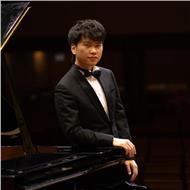How much time should I spend on piano classes?
Miranda
11 answers
I would like to take piano lessons, but I am over 30 and I'm afraid that I won't be able to learn. How much time do you think I should dedicate to the classes to achieve good progress?
0
0
0
{0} / {1} characters recommended
The response must contain at least one character
Answers
Hi Miranda, from my experience teaching students with various ages from 3 to 50+, I find adults with fully developed fingers can easily achieve great results in no time. As for reference to how much time commitment you need, for adults, if you practice 10 minutes twice a week and you take a lesson once a week for at least 30 minutes, you will achieve Grade 1 or 2 level within 6 months, giving you a pretty good jumpstart. For children aged 6 to 12, this does not tend to happen in my experience, as their hand eye coordination is not as established, and they might take a year or two before reaching Grade 1.
I'm a piano teacher based in London and I'd like to help more adults reach their dream of playing the piano or other musical instruments. You can always text me at 07554309677 for enquiries.
Write an answer
0
0
0
Yvette Iman Jaramillo Verified Tutor
Verified Tutor
 Verified Tutor
Verified TutorTo be able to learn piano in the shortest time, the important thing is that you like it and are motivated, you should dedicate 8 hours a day if you want to constantly raise your level until you achieve the goal. Later, when you already play with both hands, you can dedicate 2 hours to maintain the level but if you want to raise the level 8 hours a day is recommended in the practice of any musician. With perseverance and perseverance things are achieved, I have had students who did not play with both hands and in one hour I made them learn, I use a method practice that motivates you to play a song while you learn and relax your fingers to play and in the process it motivates you because at the end you got the song, all with a single practice, knowledge, song and learning in the shortest possible time that you can achieve.
Write an answer
0
0
0
Konstantinos pavlopoulos Verified Tutor
Verified Tutor
 Verified Tutor
Verified TutorMusicking is an activity that all people do. Even though you are 30 doesn't mean that you can't play piano. You need one lesson per week and then find the discipline and the passion to spend a little bit of time every day as a part of a pleasant activity that boost your confidence and your motivation achieving goals.
Write an answer
0
0
0
It all depends on what kind of result you want. But the general rule is the same as in other sciences - the more you study, the better the result.
Write an answer
0
0
0
Elaine Patience Verified Tutor
Verified Tutor
 Verified Tutor
Verified TutorI always say that a little practice as frequently as you can is more effective than a longer time occasionally
Write an answer
0
0
0
As Much as possible because the more you commit to practicing piano the better you become
Write an answer
0
0
0
Belinda Shave Shave Verified Tutor
Verified Tutor
 Verified Tutor
Verified TutorHi, there is absolutely no reason that you won't be able to learn. I recommend an hour lesson once per week or fortnight, and 20 minutes or so practice a day.
Write an answer
0
0
0
I would suggest 30 min at the beginning. Also depends how long you can keep attention on
Write an answer
0
0
0
I believe as long as you can read music notes, you only need 1-2 hours per week (I think 1 hour is sufficient). Most of the work comes down to your own practice everyday, and the teacher is only their to give you tips on technique and expression.
Write an answer
0
0
0
Hi Miranda!
I always say to my students that the amount of time is not necessarily as important as consistency. If you can make the time to sit at your piano for 10-20 minutes every day or two, while taking one lesson every week to keep the ball rolling, you can absolutely learn how to play, and fairly quickly too. Hope this helps!
Write an answer
0
0
0
It’s never too late to start learning the piano! As an adult, you actually have some advantages like self-discipline and the ability to grasp complex concepts. You don’t need to worry about your age at all.
If you dedicate even 30–45 minutes a day, with focused practice, you can make excellent progress. The key is consistency, not just the amount of time spent. It’s also about setting realistic goals, starting with simple pieces, and gradually working your way up. In just a few months, you’ll notice how much you’ve improved.
Write an answer
0
0
0
Related questions






